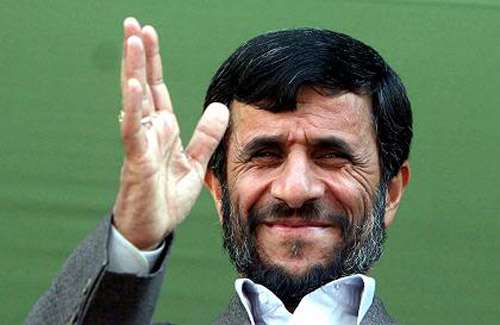
This article was originally published in the December 2007 edition of The Messenger, the Islamic newsletter distributed by the Metroplex Organization of Muslims in North Texas.
If there is one defining emblem of modern-day Iran that could capture the nation's spirit within its subtle brilliance, it is the unfaltering smile of a single revolutionary figure: Mahmoud Ahmadinejad. Apart from being a constant suggestion of his spiritual contentment and humble beginnings, that ever-present grin is a sign of all that the neoconservative world finds unlikable- a pretty good indication that this man must be in the right.
Long before the chaos of 9/11 had made its mark on modern history, America's most ardent war hawks were already brainstorming a hit list of the nations that didn't 'comply with their standards of democracy' (read: were not advantageous for the financial interests of those concerned), and hence the 'Project for the New American Century' drew up the blueprint for its 'Axis of Evil' campaign; though the Bush Administration would have to wait until the tragic attacks of September 11th (the 'New Pearl Harbor' the neocons had been dreaming of) to have a good enough excuse to publicly demonize the targeted nations. High up on this list from the get-go were oil-rich Iraq and Iran, and while North Korea might have served as a good diversion from the obvious zionist interests endorsed within the 'Axis' campaign, it was only a matter of time before Kim Jong Il would lay forgotten (though recent news reports show that President Bush is now personally exchanging letters with the dictator he allegedly loathes; referring to him as 'Dear Chairman').
Although the already-delicate circumstances in Afghanistan and Iraq led to their respective downfalls at the hands of invading forces, Iran is inevitably a force to be reckoned with, and certainly has always presented a different sort of challenge. While the wars in Afghanistan and Iraq simply meant shooting down the very self-employed puppets America had helped establish, Iran is the brainchild of a revolution that stood for something beyond the comprehension of the common warhawk mind: truth. What excuse could Bush & Co. pull out of their hats to go to war with spirited Iran? The 'national tragedy' card had been used up in the invasion of Afghanistan, and the neocons had already looked sufficiently ridiculous with the outing of the lies that led up to 'Operation Iraqi Freedom', so the third time around, it was clear that the story would have to be much more elaborate; one based on probable fact and not invisible weaponry that a wild goose chase would never turn up.
Rewind to 1974, when a study conducted by the Stanford Research Institute found that in order to meet the energy demands of its bustling population, Iran would need over 20,000 megawatts of electricity by the early 1990s. Now, 33 years after that need was first addressed, Iran modestly aims at reaching that level by 2020, saving the country a projected $10 billion per year. Backed by the express persuasion of then-Chief of Staff Dick Cheney and Secretary of Defense Donald Rumsfeld, in 1978 President Gerald Ford signed the final draft of the US-Iran Nuclear Energy Agreement, which offered Iran the "chance to buy and operate a U.S.-built reprocessing facility for extracting plutonium from nuclear reactor fuel.” The deal was for a complete 'nuclear fuel cycle'. Before one even needs to wonder why the United States would now be asking for war with a country that is merely embarking on the very course agreed upon only 3 decades prior, one very important catalyst needs to be factored in that changes everything: the 1979 revolution of Imam Khomeini (ra). The US-Iran Agreement was signed about 8 months before the revolution, at a time when Mohammad Reza Pahlavi, the Shah whom the US had helped install in its 1953 CIA coup, was still in power. Let us think back to 1953 and remember America's single motive in the deposition of Prime Minister Mossadegh: his parliament's proposal to nationalize Iran's oil industry and effectively kick out profiteering Western powerhouses such as Britain's Anglo-Iranian Oil Company. Now fast forward again to 1979, when nuclear development was halted by Imam Khomeini in the face of the Iran-Iraq War for five years, with research picking up again shortly thereafter, but this time independent of its former Western backers. Just as the US could not bear to see Iran rid itself of Western oil profiteers in 1953, it again suffers today at the prospect of Iran finally carrying out its nuclear development needs unaided by most of its previous investors.
Findings similar to those of the 1974 Stanford study have subsequently been reported in recent times by researcher Roger Stern of Johns Hopkins University, who stated in Dec. 2006 that "in five years, Iranian oil exports may be less than half their present level, and could drop to zero by 2015," and thus "Iran's claim to need nuclear power might be genuine, an indicator of distress from anticipated export revenue shortfalls." Despite the clear statistical necessity of an Iranian nuclear enrichment program, as well as the clear historical motives that expose the neocon position, the American people cannot be expected to objectively research the real roots of the issue and politicians are certainly not about to tell them, making President Bush's propaganda job a whole lot easier.
Indeed, by taking advantage of the mere existence of nuclear developments that have consistently met international precedents and are in accordance with International Atomic Energy Agency guidelines, the Bush Administration has ignored Iran's tacit compliance to the rules and turned the nation's innocuous attempts to supply its people with an inexhaustible energy supply into the backdrop of World War 3.
Until early December of this year, the Administration was doing a 'darned good job' of making the American public panic in a manner very reminiscent of pre-Iraq War days. However, Bush & Co. were dealt a stifling blow on December 3rd, when a consensus of the US's 16 national intelligence agencies concluded that Iran had abandoned its nuclear weapons program in 2003, in contradiction to the 2005 finding that Iran was definitely 'determined to develop nuclear weapons'; which has been the basis of President Bush's feisty anti-Iran rhetoric for the past several years. Although the IAEA had already refuted the House of Representatives intelligence committee's report on Iran's alleged nuclear capability in September 2006 and dismissed the allegations then as "outrageous and dishonest", mainstream American media outright ignored such statements of the IAEA until this December, when the source of the information proved too mighty to be denied. It was certainly unprecedented that American intelligence would actually admit to findings of this nature after having had no problem omitting crucial details prior to Iraq (i.e. no, Saddam doesn't actually have any WMDs), but maybe it was the 600-page criticism and international ridicule US intelligence officials faced after the Iraq blunder that led them to be a bit more honest this time around.
With regards to whether or not he felt his talk of World War III in spite of him having knowledge of the NIE report would call his credibility into question, President Bush had this to say: “No, I'm feeling pretty spirited – pretty good about life." Well, that's great, Mr. Bush. We like our world leaders to feel good... but we'll take President Ahmadinejad's smile over yours any day. It's a whole lot more believable.



Commentary of Ziyarat e Ashoura requested - it is not finished in translation I guess. But I can send you a pdf file of the abbreviated version if you provide me with your e-mail address, insha'allah.